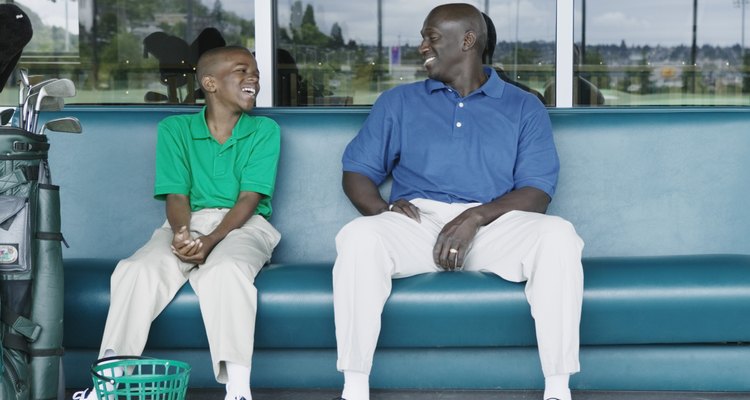
Andersen Ross/Blend Images/Getty Images
Youngsters usually benefit from having a relationship with someone older and wiser to mentor them. Although the mentor might be a teacher, family member or more experienced peer, not everyone is suitable to be an influential, positive role model. Effective role models possess desirable characteristics that make them easy to look up to. They inspire others to make changes and strive toward new goals. If you are seeking a suitable candidate to serve as a role model to someone you care about, it helps to be aware of the qualities necessary to best fulfill the role.
Moral
A good role model has high moral values. Research conducted by developmental psychologist Marilyn Price-Mitchell and reported on her website, Roots of Action, found that children respect those who practice what they preach. Role models who support worthwhile causes and who are willing to act on their beliefs help children develop and strengthen their own values. Role models behave ethically and demonstrate honesty.
Confident
Most people admire those who project confidence. Good role models have a healthy appreciation of their accomplishments. They are able to acknowledge their skills and achievements without becoming arrogant. Child development specialist and author Dr. Robyn Silverman suggests on her website that healthy self-confidence manifests as pride in who you are and what you've learned throughout your life.
Hardworking
Role models demonstrate their commitment to a desired goal and are willing to invest the necessary time and effort to achieve success. They don't give up easily and they persevere when confronted by obstacles. Their passion to succeed inspires youngsters to follow through and reach the goals they set for themselves. Olympic athletes, for example, motivate others through their dedication.
Respectful
In order for role models to be influential, they must show respect for others. Young people appreciate being treated with respect and admire those who treat them and others that way. Role models who demonstrate selflessness and a democratic, non-prejudiced view of those different from themselves earn the admiration of others.
Optimistic and Creative
Role models inspire others with an upbeat, optimistic outlook on life. It's unlikely that anyone would want to emulate a pessimistic individual. Role models tend to see the bright side in difficult situations and can find creative solutions to their problems. For example, a community leader faced with a financial setback might welcome the opportunity to organize a fund-raising project that pulls everyone together in a constructive manner.
Related Articles

What Is a Peer Facilitator?

How to Be an Effective Sunday School ...

What Are the Benefits of Self ...

Examples of a Positive Attitude

How to Respond to Passive Aggressive ...

What Are the Benefits of Being Humble?

Types of Extrinsic Motivation

Facts About Orphans

How to Handle Tough Situations With ...

How Can I Help My 11 Year Old Daughter ...

The Roles of Older Siblings

How Does Stereotyping Affect ...

Importance of the Brother Sister Bond

Teenagers and the Importance of Friends

The Importance of Father Figures

Youth Mentoring Discussion Topics

The Importance of Teenage Friendships

How to Disassociate Yourself from Bad ...

How to Deal With an INFP

Why Are Some People Spineless?
References
Writer Bio
Freddie Silver started writing newsletters for the Toronto District School Board in 1997. Her areas of expertise include staff management and professional development. She holds a master's degree in psychology from the University of Toronto and is currently pursuing her PhD at the Ontario Institute for Studies in Education, focusing on emotions and professional relationships.
Photo Credits
Andersen Ross/Blend Images/Getty Images